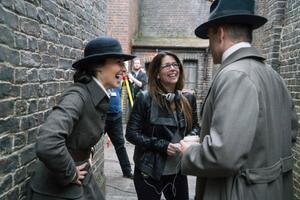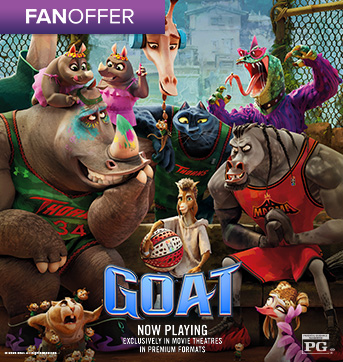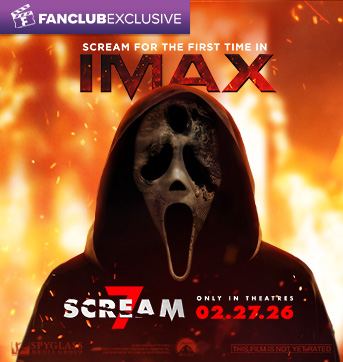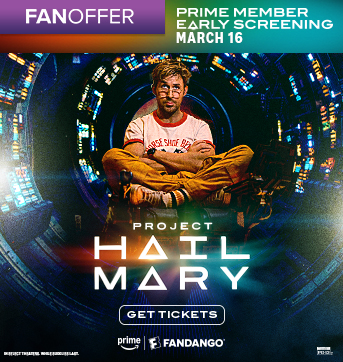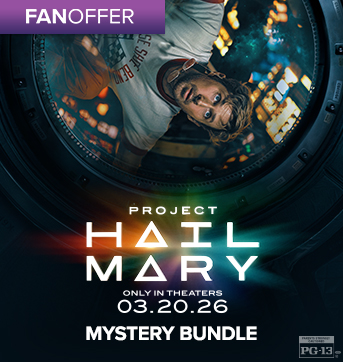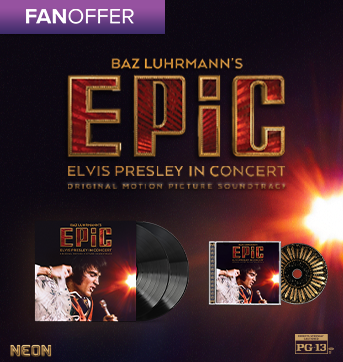
The composers reveal a few intriguing secrets about the music behind our favorite superheroes -- like the instrument used for Superman’s theme.
Hans Zimmer is one of the most prolific film composers working today, with too many great credits to count, including Pirates of the Caribbean, Inception and The Lion King, which won him his only Oscar (so far).
Zimmer is also the mastermind behind the Dark Knight trilogy scores, so when director Zack Snyder, with whom Zimmer worked on Man of Steel, asked him to score Batman v Superman: Dawn of Justice, Zimmer was a little reticent about entering Batman's cave again. He knew that in order to tackle this character’s music once more, he’d need help. He asked his good friend, Tom Holkenborg (aka Junkie XL), an accomplished film composer himself (Deadpool, Mad Max: Fury Road), to join him in collaborating on this latest DC Comics epic.
Fandango had the pleasure of sitting down with these talented men recently to discuss their thought processes in creating the incredible sound for Batman v Superman: Dawn of Justice.
Hans, you've been with this Batman guy for quite a while now.
Hans Zimmer: Interesting that you mention it because while to you it might have been a mere three movies in the Dark Knight trilogy with Chris [Nolan]. To Chris and me, it was 11 years of our lives. I was shaky about even doing Batman Begins and Chris Nolan asked me, “What is it that's troubling you?” And I said, “I can be the dark guy, but I don't know how to be the elegant one.” So I asked my friend James Newton Howard to work with me on that.
So my first reaction [when approached by Zack Snyder to do the score] was how could I honor Nolan and Christian Bale? I thought, “No, I can't do this anymore.” Then I remembered how well my friend Tom here and I worked together in the past. I really wanted a 50-50 collaboration. I wanted a real 100 percent partner in crime. We had worked together so many times before that there's a certain shorthand that comes, an aesthetic and a friendship. And the other good thing was [Tom] was an easy sell. Tom was noticed in a favorable light by Zack, I believe, when we were working on Man of Steel. He asked Tom right after, “Can you just go and quickly, in three days, do 300: Rise of an Empire for me?” which Tom did. So it was, “Yes, but I have a caveat and I have an idea...” and it took less than a half a second for Zack to go, “Great!'”

So how did Batman v Superman speak to you this time around?
Zimmer: Because I had all these doubts about how to tackle that character again, I knew I had my friend here who gave me the courage to tackle it again. So, I went darker. I went much more ambiguous. This is a far more ambiguous character than in the Dark Knight. There is conflict and at the same time, I got to work on that other part [Superman]. Everyone gets to make up their own little story and theory on these characters and the point of view I've always been writing from as far as Superman is concerned, is that his greatest ambition is to be the most human of humans.
To find that small, very simple, very pure... his theme is played on a little broken upright piano by my not-great technique. But weirdly, when I play it, it sounds right. And when a great pianist plays it, it sounds wrong. I remember playing that tune for the first time and somebody saying, “That isn't a tune.” [He and Junkie laugh]
What's the first thing you both did when you signed on to do the score?
Junkie XL: We are both thinkers. I used to be a guy that if I got a phone call to do something, whether it was a remix or whatever, I'd go “Yeah, yeah, yeah, okay, okay, got it” and then immediately start working. What I've learned in the 12 years being here in Hollywood and trying to do this film composing thing, though, is that it's such a big arc. It's almost like an album. So if you get asked to write an album, you're not going to put the phone down and start immediately writing the album. You have to think about it...
Before we even start on a scene level on a movie, we spend weeks and weeks chewing on music materials, sounds. Then we create these really elaborate pieces of music and then we get the director in and we play it. And we ask, “Do you recognize your movie in this and the character?” And we work on it more. At this point, you're weeks and months into the process and then you go, “Let's look at the beginning of the movie and what shall we do there?”
Zimmer: The easiest way to describe it is that there's a primeval human thing that happens. A director comes to you, and what they say is, “I want to tell you a story.” Who doesn't love having someone tell you a great story? Zack got us up to his bunker and he had this visual onslaught ready for us. For the first time, I really noticed someone bringing a comic book to life. Yes, many people have made comic book movies, but he seems to be able to tap into a way of shooting that is so true to the underlying spirit of a comic book.

It must be easier to have someone else to work with, right?
Zimmer: It's easier, but also twice as much work. Because just when you think you've finished something, he comes in and goes, “It's great, but I have this idea.” And you go, “Wow, yeah, that's a really cool idea!” And then let's go and unravel it all.
Junkie XL: It's like raising two puppies. You have one under control and the other puppy is wrecking the carpets.
Zimmer: There's this crazy-scientist thing that happens between Junkie and me. We both love sound, we love pushing sound. We love the exploration of sound. One of the things I think we both love about cinema is that it's a big screen and a big sound system. You get to go and have an experience you can't get anywhere else—the shared dreaming that Chris Nolan taught us. I mean, where else do you get to do this? Where else do you get to make the tiniest smallest sound significant and the biggest raw sound equally significant? Where can you have that emotional escape?”
Do you have a personal favorite score?
Junkie XL: My dream always was when I got into music to one day write a track that would be perfect. And I know by now that it just doesn't exist. Like, if you would have asked me what my favorite film score was right after I did Mad Max: Fury Road, I would say Mad Max. Two months later, I would say Black Mass. But now when I listen to Mad Max, I go, “I'd never do that again, or that. I could do that way better.”
Zimmer: When you ask me which score I love most, are you talking about the quality of the music or the quality of the experience I had with the people making it? I can't judge the quality of the music, but I can you tell you writing for all the wrong reasons. Writing The Lion King because I wanted to take my six-year-old daughter to a premiere. That was my motivation. Now, that's not the right way to do it.
Junkie XL: And at this point, I think, if I speak for you [looking at Zimmer] Batman v Superman was a long, intense process, a great way to work with Zack. We need some time to enjoy the fact that this movie is coming out and that people will like it. [We need] to distance ourselves from it. It's not really the same, but the idea of giving birth to a baby is what it is – it's a load that becomes heavier throughout the process and then the last couple of weeks are really intense. And then it's just there and you want to enjoy it.
Zimmer: Now we are in a period where people expect us to write a motif that will work for Wonder Woman, for instance, five years down the road. It's very hard. The people we work with throw everything in. We throw the kitchen in, not just the kitchen sink. But when we are finished, we are done. There's nothing left to say.



